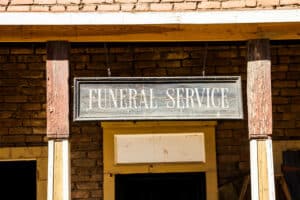Why Funeral Directives Matter in New Jersey
In Estate Planning, It’s Crucial to Decide How Your Remains Will Be Handled. New Jersey Has Default Rules for Cases Where A Will Doesn’t Specify.
 While the thought of one’s mortality may not be pleasant, it is crucial to document your preferences on how you wish to be remembered, memorialized, and interred. The significance of this cannot be overstated, as it can prevent family disputes that often result in significant financial costs. A funeral directive is a clear statement of your posthumous wishes, detailing how and where you want your remains to be handled after your passing.
While the thought of one’s mortality may not be pleasant, it is crucial to document your preferences on how you wish to be remembered, memorialized, and interred. The significance of this cannot be overstated, as it can prevent family disputes that often result in significant financial costs. A funeral directive is a clear statement of your posthumous wishes, detailing how and where you want your remains to be handled after your passing.
Legal Framework for Funerals and Cemeteries in New Jersey
The New Jersey Cemetery Act of 2003 regulates funeral directives, burial procedures, and cemetery regulations. Disputes regarding someone’s funeral arrangements or burial can be litigated using the Act as a foundation for or against an argument. According to the law, any individual has the right to choose the person who will carry out their last wishes regarding their funeral.
A Guide to Funeral Agents and Directives in New Jersey
According to New Jersey law, a person can appoint someone to make the decisions regarding the funeral and disposition of the human remains. The appointed person, known as a funeral agent, does not have to be a family member or executor of the will. The agent has significant decision-making power regarding the remains, memorial, burial, cremation, and ceremonies for the deceased. The family’s input can be received, but no one else has the decision-making power that the funeral agent has.
When this agent is named in the will, it can be problematic as the will isn’t usually read until after the funeral. The Office of the New Jersey Attorney General offers a form known as the Appointment of Agent To Control the Funeral and Disposition of Remains, which can be completed by the interested party and notarized in the presence of and with the signatures of two witnesses. This brief form trumps any other agent listed in the will and testament.
The funeral directive is your opportunity to express your final wishes and have control over your funeral arrangements. It should include the funeral provider who will care for the remains and whether the body should be cremated, buried in its natural state, or embalmed. You can decide whether the burial should be in-ground, above ground in a crypt, in a private mausoleum, or as a natural burial. If cremation is your preference, you can specify where the ashes should be stored or spread. The venue for the funeral can be named, whether it is a church, tabernacle, mosque, funeral home, graveside, or somewhere else meaningful to you. You can even decide how the body will be transported, the list of invited guests, and how the notice of your death will be given. This form also provides an area to explain how your funeral expenses will be paid, giving you the freedom to plan and control these aspects of your final arrangements.
Significance of Family Hierarchy in Funeral Plans
According to New Jersey Rev. Stat. 45:27-22 the funeral agent can relay control of the funeral and disposition to a family member but in accordance with the hierarchy given in the law, which is the surviving spouse of the decedent (or civil union/domestic partner), the surviving adult children, the parents of the decedent, the brothers and sisters of the decedent, and any next of kin according to the degree of bloodline.
Home burials can be performed, but it is essential to check with the town clerk as to specific land restrictions. New Jersey requires that a funeral director be present at all funerals, whether at a cemetery or a private residence. Until 2020, serving food or drinks at a funeral home was illegal. There was concern for public health having food around a dead body, but with technological advances, this is no longer a concern. Alcoholic beverages are still prohibited.
Celebrating Life Through Personalized Funerals in NJ
New Jersey’s restrictions on scattering a loved one’s cremated remains are limited. It is always a good idea to check beforehand to avoid any problems. Private property, with the owner’s permission, state and federal parks, waterways, gardens, and cemeteries can all be used, but only with the expressed consent of their caretakers.
Whatever the decedent chooses should be adhered to regarding a memorial, funeral, or life celebration, as long as it doesn’t break any laws. For example, if someone chooses to have Elvis impersonators as their pallbearers, that is their choice. But if they want the cemetery to be converted into a petting zoo, that may require agriculture and health permits that are too complicated to wrestle with in a short period. What food to serve, music to play, poetry to read, or jokes to tell can all be decided ahead of time and put in their funeral plan. Some people request that the mourners wear bright colors instead of black or dress according to a specific theme that inspired the decedent, such as the Roaring 20s. The decedent chooses an agent they believe will honor their wishes and expect them to be carried out.
Options to Resolve Funeral Directive Disputes in New Jersey Courts

If there is no directive, the court must consider written evidence between the decedent and others, indicating the decedent’s final wishes regarding funeral arrangements and the body’s disposition. Heated battles between family members can ensue when everyone claims to have first-hand knowledge of strictly what the decedent had intended. The court considers the next-of-kin hierarchy (N.J.S.A. 45:27-22) and the nature of the relationships between the decedent and the embattled family members to surmise which members had a closer relationship with the decedent. It would be better positioned to know the decedent’s desires.
If You Have Questions Regarding Funeral Directives at the Jersey Shore, Speak to an Attorney in Our Office Today
No one enjoys contemplating their passing, but adding the uncertainty of your last wishes to the already overwhelming difficulty the grievers face is avoidable by leaving your desires for your funeral in writing. You can gift your loved ones by establishing a plan for what should happen after you are gone. Bronzino Law Firm has extensive experience in estate management, wills, trusts, and advanced directives in Tinton Falls, Lacey, Beach Haven, Middletown, Toms River, Monmouth Beach, Mantoloking, and other Monmouth County and Ocean County areas. We will work with you to draft a plan that reflects your personal needs, beliefs, and wishes. Our goal is to give you the peace of mind that comes with the careful planning of your estate.
Contact us today by calling (732) 812-3102 or completing our easy to use form to schedule a free consultation with one of our experienced estate planning lawyers. We can answer any questions you have and help you move forward with all of your bases covered.







